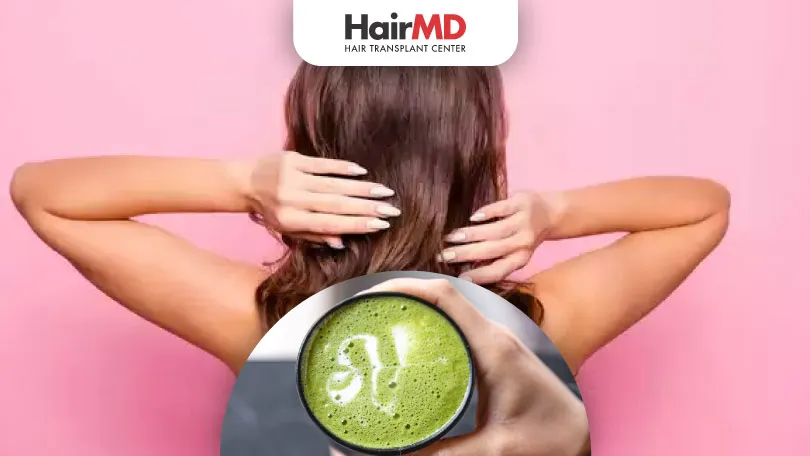12th October, 2021

Your hair symbolises your beauty, and beautiful hair boosts your confidence. If you have brittle or damaged hair with a receding hairline, then you might try to hide away from public gatherings or look for a scarf to cover your hair. Experiencing hair loss is an emotionally draining phase.
The factors behind hair loss can be varied, and that can also depend on your genetics and hormonal imbalance. Everyone deserves lustrous and voluminous hair. In today’s blog, we will learn how your weight-loss tea can help you grow hair and reduce hair damage.
Japanese matcha green tea for hair loss is gaining popularity these days due to its health benefits.
What’s covered in the article?
- How is matcha green tea good for hair growth?
- Side Effects
- Conclusion
How is matcha green tea good for hair growth?
Matcha green tea is more beneficial than your regular green tea as it has many more antioxidant properties than green tea, helps fight the free radicals in the scalp, and reduces the oxidative stress affecting the hair follicles. Researchers have found that matcha is also rich in essential minerals, amino acids and vitamins, enhancing and nourishing hair. Panthenol, a B vitamin present in this Japanese tea, strengthens hair and repairs damaged hair, such as split ends, promoting new hair growth.
Matcha green tea is more beneficial than regular green tea; in matcha tea, the entire leaf nutrient is present, ensuring the plant power of Epigallocatechin Gallate, or EGCG, is present in the tea. EGCG blocks excessive DHT production, which can gradually lead to male pattern and female pattern balding. EGCG, therefore, helps in preventing hair loss. It also helps stimulate the dermal papilla, which induces hair growth. Matcha also contains vitamins C, E, selenium chromium, zinc and magnesium, which protect against sun radiation and also increase blood circulation in the scalp.
Polyphenols found in the tea leaves, and matcha powder help strengthen hair roots and hair follicles to facilitate hair growth.
Many shampoos are also available with matcha green tea as an active ingredient which can be beneficial in fighting dandruff and can also help in soothing the scalp, keeping psoriasis irritation at bay.
Side Effects
Matcha green tea contains a high amount of caffeine, which may cause-
-
- Headaches
- Diarrhea
- Insomnia or loss of sleep
- Acne breakouts
Therefore, consult a hair doctor before using matcha green tea.
These topical solutions and dietary supplements may aid in nourishing the scalp, but standalone matcha green tea for hair loss may not be effective. Dermatologists always suggest opting for scientifically proven treatments for hair loss and other scalp issues.
Experiencing excess hair loss or hair thinning can be because of any infection or underlying disease. Consult the expert dermatologists at HairMD to get the right treatment.
Do You Know?
Nearly 250 Patients Visit HairMD
Everyday For Various Hair Concerns?
(You are one click away from flawless skin)
Meet Our Dermatologists
Conclusion
In conclusion, matcha tea offers several potential benefits for hair health, such as promoting hair growth, preventing damage, and reducing DHT levels linked to hair loss. Rich in antioxidants, vitamins, and minerals, it nourishes hair follicles and strengthens roots. However, matcha alone may not resolve hair loss entirely, so it’s essential to pair it with scientifically backed treatments and consult a dermatologist for personalized advice.
Further Reading
Itchy Scalp and Hair Loss: Causes, Treatments, and Prevention
Itchy scalp and hair loss can be troubling, hinting at deeper scalp and hair health issues. Discover the connection in this comprehensive guide.
Dandruff Fungus Treatment
Learn how dandruff and fungus impact scalp health. With HairMD, you can get expert advice on causes, treatments, and prevention tips to maintain a healthy, flake-free scalp.
Helmet Use and Hair Loss: What You Need to Know
Does wearing a helmet cause hair loss? Understand the connection, debunk myths, and explore preventive tips with expert insights from HairMD.
Top Causes of Hair Loss in Women and How to Address Them
Discover the key causes of hair loss in women, including hormonal changes, stress, and nutritional deficiencies. Learn effective solutions and treatments with HairMD experts.
Have thoughts? Please let us know
We are committed not only to treating you, but also educating you.











